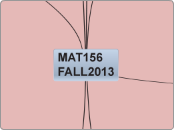realizată de Soyoun Park 11 ani în urmă
196
MAT156 FALL2013

realizată de Soyoun Park 11 ani în urmă
196

Mai multe ca aceasta
Ladder Method or The division by Primes Method
Prime factorization Method
Intersection of Sets Method
Number-Line Method
Ladder Mehtod of Division by Primes Method
Calculator Method
Prime Factorization Method
The Intersection of Section Method
Colored Rods Method
Number of Divisor
Ladder Model
Factor Tree
Prime factorization- factorization containing only prime numbers.
Factorization- Composite numbers can be expressed as product of two or more whole numbers greater than 1.
Numbers in which there are more than two factors or positive divisors. (ex) 4, 8, 12, 16
Numbers in which there are only two factors or positive divisors. (ex) 2, 3, 5, 7
The order of operations: parenthesis, exponents, multiply/divide left to right/ add/subtract left to right.
The quotient of two negative integers, is a positive integer and the quotient of a positive and negative integer, is negative.
Properties of Integer Multiplication
Number-Line Model
Chip Model and Charged-Field Model for Multiplication
Patterns Model for Multiplication of integers-3(-2)=-6, 2(-2)=-4, 1(-2)=-2
Properties of Subtraction
Subtraction Using Adding the Opposite Approach
SubtractionUsing the Missing Addend Approach
Pattern Model for Subtraction
Number Line Model for Subtraction
Charged-Field Model for Subtraction
Chip Model for Subtraction
For every integer a, there exists a unique integer -a, the additive inverse of a.
Absolute Value-The distance between the point corresponding to an integer and 0 is the absolute value of the integer.
Pattern Model- Addition of integers can also be motived by using patterns of addition of whole numbers.
Number Line Model- Always start at zero and move line to first number, then go to second number.
Charged-Field Model- Similar to chips but used the positive (+) and negative (-) charges.
Chip Model for addition-Black chips are used to represent positive integers and negative integers are red.
Addition of Rational Numbers with unlike Denominators
Addition of Rational Numbers with like Denominators
Number-line Model
Area Model
Rouding- off Errors
Estimating Decimal Computations
Rounding Decimals
Mental Computations
Dividing Decimals
Scientific Notation
Lattice multiplication
Multiplication with two-digit factors
Single digit number times two digit number
Parenthesis, Exponents, Multiplication or Division, Addition or Subtraction
0 divided by 0 is undefined also
0 divided by n=0
n divided by 0 is undefined
Repeated subtraction model
Missing-Factor model
Set (Partition) model
Distributive property of multiplication over addition and subtraction
Zero multiplication property of whole numbers
Identity property of multiplication of whole numbers
Associative property of multiplication of whole numbers
Commutative property of multiplication of whole numbers
Closure propery of multiplication of whole numbers
Cartesian-Product Model
The Array and Area Model
Repeated-Addition Model
Counting back
Making 10
Doubles
Counting on
Identity Property
Associative Property
Commutative Property
Closure Property